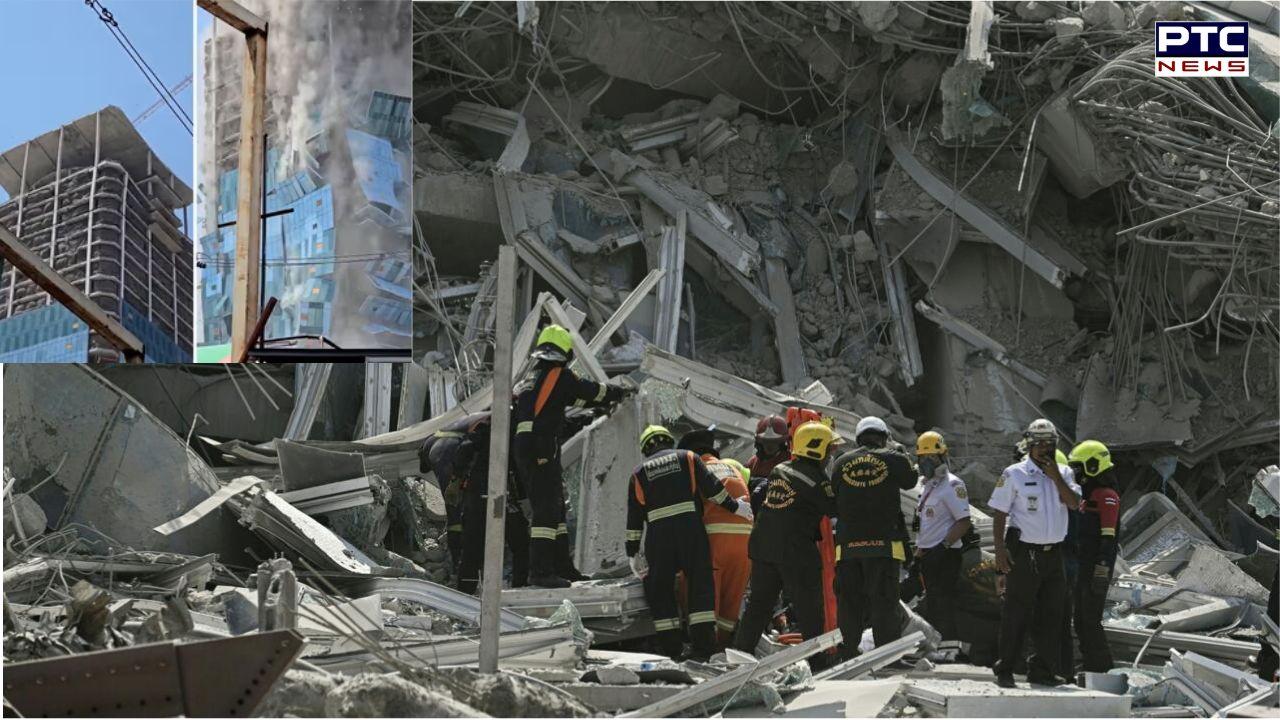

Bangkok skyscraper collapse sparks structural concerns; China-Thai joint venture under investigation
PTC Web Desk: A powerful 7.7 magnitude earthquake struck Myanmar on Friday, causing devastation over 1,000 km away in Bangkok, Thailand, where a 33-storey under-construction high-rise building collapsed. The disaster has raised concerns over possible structural flaws, prompting Thailand's Deputy Prime Minister Anutin Charnvirakul to order an urgent investigation.
Bangkok Skyscraper Collapse: What Happened?
The high-rise building, still under construction, came crashing down following the intense tremors. So far, eight bodies have been recovered from the debris. The authorities confirmed that the structure was set to become the headquarters of Thailand’s State Audit Office (SAO) and had been under construction for the past three years, with a total budget exceeding two billion Thai baht ($58 million).
Eyewitnesses reported that cranes dotted the building, yet the structure collapsed almost instantly under the impact of the quake. This has led experts to question why the building failed so quickly while other high-rises in the vicinity remained intact.
Structural Flaws or Natural Disaster?
Civil engineer and politician Prof Suchatchavee Suwansawas from Thailand’s Democrat Party told The Telegraph UK that the incident was highly unusual. "You see other buildings, even high-rise ones under construction—they are safe. Something was definitely wrong. Either the design was flawed, or construction was faulty, but it's too soon to draw conclusions," he said.
The Ministry of Industry has dispatched an inspection team to the site to assess whether low-quality steel, poor engineering design, or inadequate construction materials played a role in the collapse.
China-Thai Joint Venture Under Scrutiny
The skyscraper was a joint venture between Italian-Thai Development Plc and China Railway Number 10 (Thailand) Ltd, a subsidiary of China Railway Number 10 Engineer Group Company. The Chinese firm held a 49% stake—the maximum foreign ownership allowed under Thai regulations.
Reports indicate that China Railway Number 10 Thailand was established in 2018, focusing on constructing office buildings, residential complexes, roads, railways, and underground transport systems. However, the company reported a net loss of 199.66 million baht in 2023, with revenues of 206.25 million baht and expenses totaling 354.95 billion baht.
Its shareholders include: Sophon Meechai (40.80%), Prachuab Sirikhet (10.20%) and Manas Sri-anant (3%).
Given these financial struggles, concerns are now being raised about whether cost-cutting measures impacted the quality of construction materials used for the collapsed high-rise.
As of Sunday, the authorities confirmed 18 deaths in Bangkok, with 33 persons injured and 78 others still missing—most of whom were construction workers trapped beneath the rubble.
Rescue teams, including police officials and trained sniffer dogs, are racing against time to locate survivors. "Within the first 72 hours, we must do everything possible to save lives," said Thai police commander Teerasak Thongmo.
Meanwhile, the death toll in Myanmar has risen to 1,700, with 3,400 injured and over 300 missing. The earthquake, which originated at a shallow depth of just 10 km, caused extreme surface shaking, increasing destruction in surrounding areas.
- With inputs from agencies
